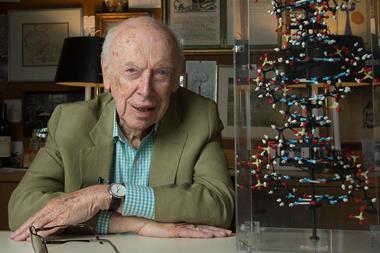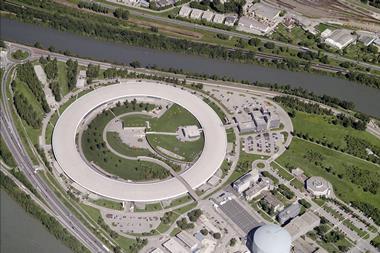The personal values held by scientists should influence the accolades they receive

Chemist Anna Krylov of the University of Southern California has argued in a recent article1 in the Journal of Physical Chemistry Letters that science is becoming dangerously politicised. In a response2 in the same journal, I have argued that science itself has always been political; the question is not how to prevent that but what to do with it.
Chemist Anna Krylov of the University of Southern California has argued in a recent article in the Journal of Physical Chemistry Letters that science is becoming dangerously politicised.1 In a response in the same journal,2 I have argued that science itself has always been political; the question is not how to prevent that but what to do with it.
Krylov’s article is in fact a prime example of politics masquerading as objectivity. ‘I witness ever-increasing attempts to subject science and education to ideological control and censorship’, she says – by which she is referring to discussions about race and gender biases and imbalances, about the appropriateness of nominative memorials to the likes of William Shockley (an evident racist), and calls for equity, diversity and social justice. Such efforts, she says, are examples of ‘extreme left ideology’ that is ‘turning STEM education into a farce.’
There is a valid point here: we do need to have a considered discussion about whether and when to rename institutions and awards if the individuals they are named for upheld values inimical to the promotion of equality in science today. As I say in my response, the initial removal of Peter Debye’s name from the University of Utrecht’s nanomaterials institute when he was accused in 2006 of collusion with the Nazis3 was premature and ill-considered. ‘Cancelling’ him isn’t the solution – but neither is pretending there is no case to answer.
Politicised statements are being smuggled into the chemistry literature under the guise of objectivity
Krylov implies that any reconsideration of science’s practices in the light of Black Lives Matter and well-documented race-, gender- and class-based discrimination is a threat to democracy and the pursuit of truth equivalent to that of the Stalinist Soviet Union. Along with her citation of sources like the 2020 book Cynical Theories (coauthored by a rightwing provocateur), this exposes her article as deeply politicised. (Her frequent citation of Wikipedia as a historical source, meanwhile, exposes it as something else.) As with the recent notorious example in which a review of developments in organic synthesis included a condemnation of efforts to make science more inclusive, we could reasonably feel concerned here that politicised statements are being smuggled into the chemistry literature under the guise of objectivity.
This underscores the point made by historian of science Naomi Oreskes that when scientists argue that they are presenting their work in a value-neutral way, not only should we not believe them but we would be justified in not really trusting them either. Sure, we probably don’t need to worry that someone’s Marxist leanings have infiltrated their Arrhenius plots – but there is a good reason why scientists are asked to declare possible conflicts of interest and sources of funding in their papers.
The contrast between Oreskes’ careful discussion of science and values in her recent book Why Trust Science? and Krylov’s simplistic analysis could not be more stark. Talking of which: Krylov says that the naming of the Stark effect after German physicist and Nobel laureate Johannes Stark ‘elicits no emotional response in me’. Perhaps that’s because she thinks Stark simply ‘defended the expulsion of Jews from German institutions’ (as she phrases it) and does not know he was an ardent Nazi and a virulent anti-Semite who called Hitler ‘God’s gift from times when races were purer.’
Removing tributes to racists, supremacists and slave-traders is not a cancelling of history but its opposite
It’s a peculiar equivalence that Krylov offers. She tells us that Marie Curie was almost cancelled by the Nobel committee for the immorality of her affair with Paul Langevin, and that Alan Turing was cancelled for the immorality of his homosexuality. Space is short, so I can only add that these are caricatures of the true histories. But isn’t there something odd in saying we should hesitate to stop honouring racists because we’d be indulging much the same impulse as that behind the earlier oppression or exclusion of women, gay people, or ‘non-Aryans’?
Historians have repeatedly pointed out that removing statues and other tributes to racists, supremacists and slave-traders is not a cancelling of history but its opposite: an acknowledgement of the history that is glossed over by these public celebrations. Awards and accolades distort that history: a scientist with unpleasant views is afforded much more prominence and tolerance if they have a Nobel, as has been evident in the case of the racist views of James Watson.
Krylov is right that ‘Scientists are not saints. They are human beings born into places and times they did not choose.’ Yet it is absurd to suggest that, by naming things after them, we do not in some degree elevate and sanctify them. Personally I can live with the Debye length and the Haber process, but I don’t consider it very wise to continue creating such hostages to fortune.
References
1. A Krylov, J. Phys. Chem. Lett., 2021, 12, 5371 (DOI: 10.1021/acs.jpclett.1c01475)
2. P Ball, J, Phys. Chem. Lett., 2021, 12, 6336 (DOI: 10.1021/acs.jpclett.1c02017)
3. M Eickhoff, In the Name of Science? P. J. W. Debye and His Career in Nazi Germany. Aksant, Amsterdam, 2008












1 Reader's comment